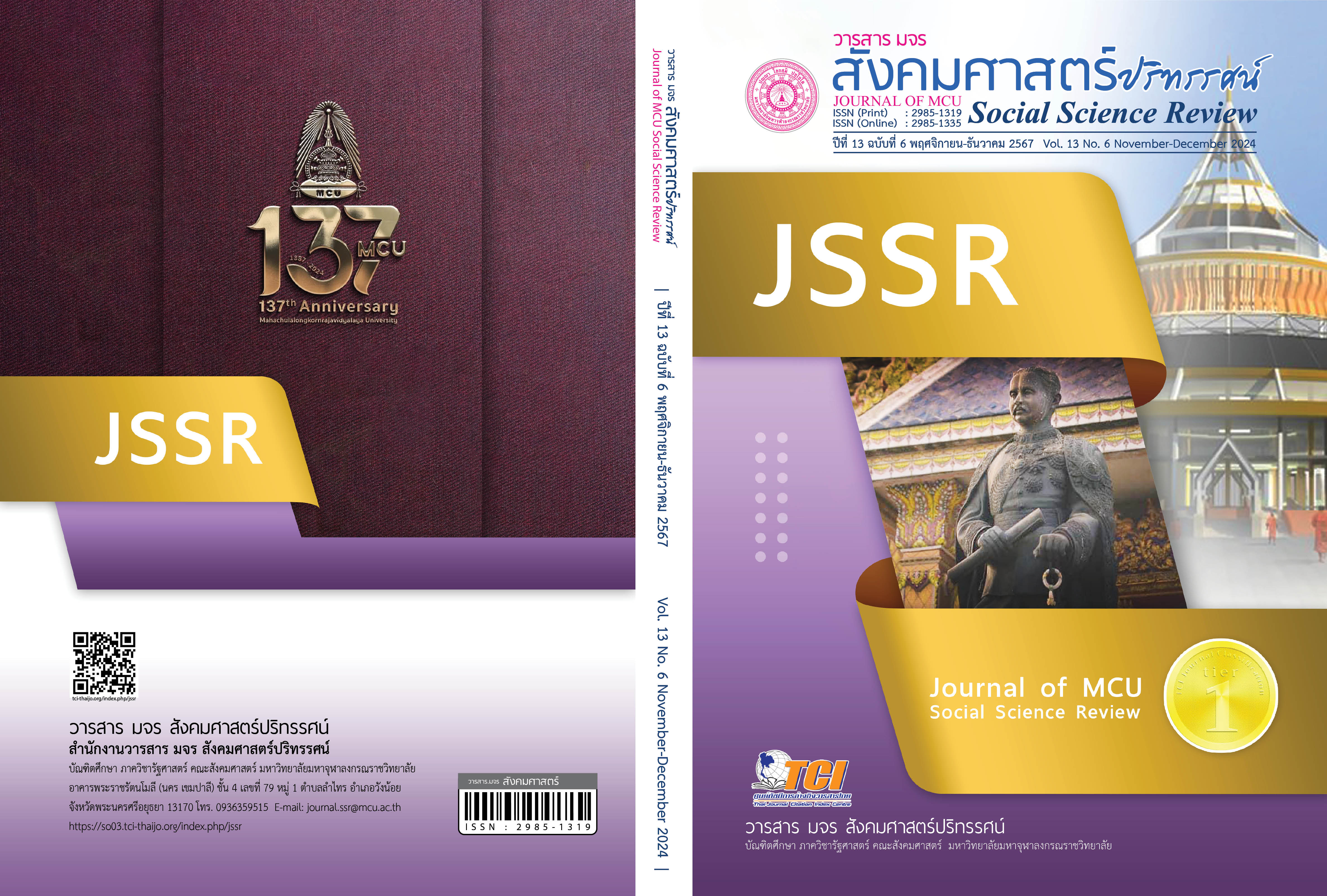การบูรณาการหลักพุทธธรรมเพื่อการบริหารจัดการวิสาหกิจชุมชน กลุ่มผ้าทอมือพื้นเมืองในจังหวัดเชียงใหม่
คำสำคัญ:
การบูรณาการหลักพุทธธรรม, การบริหารจัดการวิสาหกิจชุมชน, ผ้าทอมือพื้นเมืองบทคัดย่อ
บทความวิจัยนี้มีวัตถุประสงค์ 1. ศึกษาการบริหารจัดการวิสาหกิจชุมชนกลุ่มผ้าทอมือ2. ปัจจัยที่ส่งผลต่อการบริหารจัดการวิสาหกิจชุมชนกลุ่มผ้าทอมือ 3. นำเสนอการบูรณาการหลักพุทธธรรมเพื่อการบริหารจัดการวิสาหกิจชุมชนกลุ่มผ้าทอมือ ดำเนินการวิธีวิจัยแบบผสานวิธี เก็บข้อมูลกับกลุ่มตัวอย่าง จำนวน 122 คน และสัมภาษณ์ผู้ให้ข้อมูลสำคัญ 18 รูปหรือคน เครื่องมือในการวิจัยเป็นแบบสอบถามและแบบสัมภาษณ์ ใช้การวิเคราะห์ข้อมูลทั้งเชิงพรรณนาและเชิงอนุมาน
ผลการวิจัยพบว่า 1. การบริหารจัดการวิสาหกิจชุมชนในจังหวัดเชียงใหม่ ภาพรวมอยู่ในระดับมาก 2. ปัจจัยที่ส่งผลต่อการบริหารจัดการวิสาหกิจชุมชนกลุ่มผ้าทอมือ พบว่า 1. การบริหาร ประกอบด้วย เงิน คน วัสดุสิ่งของ 2. หลักปาปณิกธรรมประกอบด้วย วิธูโร จัดการดี นิสสยสัมปันโน มีมนุษย์สัมพันธ์ จักขุมา มีวิสัยทัศน์ ส่งผลต่อการบริหารจัดการวิสาหกิจชุมชนกลุ่มผ้าทอมือพื้นเมืองในจังหวัดเชียงใหม่ อย่างมีนัยสำคัญทางสถิติที่ระดับ 0.05 3. การบูรณาการหลักพุทธธรรมเพื่อการบริหารจัดการวิสาหกิจชุมชนกลุ่มผ้าทอมือพื้นเมืองในจังหวัดเชียงใหม่ พบว่า การบริหารจัดการวิสาหกิจชุมชนกลุ่มผ้าทอมือพื้นเมืองในจังหวัดเชียงใหม่ 6 ด้าน โดยนำหลักปาปณิกธรรมมาบูรณาการเพื่อส่งเสริมการบริหารจัดการวิสาหกิจชุมชนกลุ่มผ้าทอมือพื้นเมืองทั้ง ด้านจักขุมา การมีวิสัยทัศน์ ด้านวิธูโร การจัดการ ด้านนิสสยสัมปันโน การมีมนุษย์สัมพันธ์ และนำหลักการบริหารมาเป็นพื้นฐานในการส่งเสริมการบริหารจัดการวิสาหกิจชุมชนกลุ่มผ้าทอมือพื้นเมืองในจังหวัดเชียงใหม่ทั้ง คน เงิน วัสดุสิ่งของ และการจัดการ
เอกสารอ้างอิง
กลุ่มวิสาหกิจชุมชน กลุ่มผ้าฝ้ายเชิงดอย จังหวัดเชียงใหม่. (2567). กลุ่มผ้าฝ้ายเชิงดอยจังหวัดเชียงใหม่ ร่วมใจอนุรักษ์ภูมิปัญญาท้องถิ่น กระตุ้นเศรษฐกิจชุมชนหลังวิกฤติโควิด-19. สืบค้น 30 มกราคม 2567, จาก https://www.eef.or.th/communities/2563-beginning-43/
จังหวัดเชียงใหม่. (2565). แผนพัฒนาจังหวัดเชียงใหม่ (พ.ศ. 2566-2570) ฉบับทบทวนปี พ.ศ. 2567. สืบค้น 30 มกราคม 2567, จาก https://shorturl.asia/73ksp
ณัฐพล บัวเปลี่ยนสี และคณะ. (2560). การพัฒนาศักยภาพของวิสาหกิจชุมชนเพื่อสร้างความเข้มแข็งอย่างยั่งยืน กรณีศึกษาวิสาหกิจชุมชน จังหวัดฉะเชิงเทรา. วารสารบัณฑิตวิทยาลัย มหาวิทยาลัยราชภัฏราชนครินทร์, 1(1), 43-50.
พระธรรมโกศาจารย์ (ประยูร ธมฺมจิตฺโต). (2549). พุทธวิธีการบริหาร. กรุงเทพฯ: โรงพิมพ์มหาจุฬาลงกรณราชวิทยาลัย.
พระพรหมคุณาภรณ์ (ป. อ. ปยุตฺโต). (2554). พจนานุกรมพุทธศาสตร์ ฉบับประมวลธรรม. กรุงเทพมหานคร : พิมพ์ที่บริษัท สหธรรมมิก จำกัด.
ภูริพัฒน์ ถนอมศรีอุทัย. (2565). การบูรณาการหลักพุทธธรรมเพื่อส่งเสริมการพัฒนาอุตสาหกรรมเครื่องสำอางในประเทศไทย (ดุษฎีนิพนธ์ปรัชญาดุษฎีบัณฑิต สาขาวิชารัฐประศาสนศาสตร์). พระนครศรีอยุธยา: มหาวิทยาลัยมหาจุฬาลงกรณราชวิทยาลัย.
ศรีพนา ศรีเชื้อ. (2560). การเสริมสร้างคุณลักษณะภาวะผู้นำที่พึงประสงค์ของนายทหารหญิงชั้นสัญญาบัตร กองทัพอากาศ ตามแนวพุทธธรรม (ดุษฎีนิพนธ์พุทธศาสตรดุษฎีบัณฑิต สาขาวิชารัฐประศาสนศาสตร์). พระนครศรีอยุธยา: มหาวิทยาลัยมหาจุฬาลงกรณราชวิทยาลัย.
สมจิต ขอนวงค์ และคณะ. (2560). วิสาหกิจผ้าทอเมืองแพร่ : องค์ความรู้ และการจัดการเชิงเครือข่าย เพื่อการพัฒนาที่ยั่งยืน (รายงานการวิจัย). พระนครศรีอยุธยา: มหาวิทยาลัยมหาจุฬาลงกรณราชวิทยาลัย.
สมบัติ นามบุรี. (2562). โมเดลความสัมพันธ์เชิงสาเหตุแบบพุทธบูรณาการของภาวะผู้นำการเปลี่ยนแปลงในศตวรรษที่ 21 ของผู้บริหารการท่องเที่ยวแห่งประเทศไทย (ดุษฎีนิพนธ์ปรัชญาดุษฎีบัณฑิต สาขาวิชารัฐประศาสนศาสตร์). พระนครศรีอยุธยา: มหาวิทยาลัยมหาจุฬาลงกรณราชวิทยาลัย.
Yamane, T. (1973). Statistic: An Introductory Analysis (3rd ed). New York: Harper and Row.
ดาวน์โหลด
เผยแพร่แล้ว
รูปแบบการอ้างอิง
ฉบับ
ประเภทบทความ
สัญญาอนุญาต
ลิขสิทธิ์ (c) 2024 วารสาร มจร สังคมศาสตร์ปริทรรศน์

อนุญาตภายใต้เงื่อนไข Creative Commons Attribution-NonCommercial-NoDerivatives 4.0 International License.
เพื่อให้เป็นไปตามกฎหมายลิขสิทธิ์ ผู้นิพนธ์ทุกท่านต้องลงลายมือชื่อในแบบฟอร์มใบมอบลิขสิทธิ์บทความให้แก่วารสารฯ พร้อมกับบทความต้นฉบับที่ได้แก้ไขครั้งสุดท้าย นอกจากนี้ ผู้นิพนธ์ทุกท่านต้องยืนยันว่าบทความต้นฉบับที่ส่งมาตีพิมพ์นั้น ได้ส่งมาตีพิมพ์เฉพาะในวารสาร มจร สังคมศาสตร์ปริทรรศน์ เพียงแห่งเดียวเท่านั้น หากมีการใช้ภาพหรือตารางหรือเนื้อหาอื่นๆ ของผู้นิพนธ์อื่นที่ปรากฏในสิ่งตีพิมพ์อื่นมาแล้ว ผู้นิพนธ์ต้องขออนุญาตเจ้าของลิขสิทธิ์ก่อน พร้อมทั้งแสดงหนังสือที่ได้รับการยินยอมต่อบรรณาธิการ ก่อนที่บทความจะได้รับการตีพิมพ์ หากไม่เป็นไปตามข้อกำหนดเบื้องต้น ทางวารสารจะถอดบทความของท่านออกโดยไม่มีข้อยกเว้นใดๆ ทั้งสิ้น





